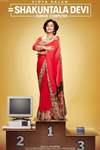Post release film disection by the director of the film and film journalist Ankur Pathak.
Some excerpts here since IF doesn't allow posting of full article.
Shakuntala Devi: Director Anu Menon On The Film's Triumphs, Flaws And Its Depiction Of HomosexualityMenon, who directed the Vidya Balan-starrer that recently released on Amazon Prime Video, unpacks the craft and creative decisions behind the film.
By Ankur Pathak
08/08/2020 01:43am IST

What I liked the most about ‘Shakuntala Devi’ was that it gave the character the Chulbul Pandey treatment. Initially, the lack of subtlety put me off, but later it appeared that the film’s loud tone mirrors the personality of its protagonist.
Thank you. If you watched it with your family, maybe you would have felt that even more. If you watch it alone, then the pitch feels higher. I know the volume I’ve put in and why. When you go to a theatre, you need that energy. I got a lot of love for Waiting after it went on Netflix. When people saw it in the theatre, they thought it was good. When they saw it alone, they wept.
Having made a film like Waiting, I think I know how to make a quiet film. But when you are writing a film like Shakuntala Devi, you underline the comedy a bit more. The most loved scene in the film is the ‘normal’ scene. It is an Ishita Moitra scene. I had written a scene which was so subdued and muted, she said ‘no, let me tell you how it should be played’. I was giggling when she sent me her scene. At that moment, I realised why I hired her.
Because you wouldn’t naturally come up with something like that?
Instinctively, I’m more muted. I don’t have that chulbula-ness (playfulness) in me. The character is just not me, the character is a drama queen and I knew Ishita has that. Her politics are bang on but she’s a 90s Bollywood baby and I’ve never watched any of those films. So that’s not my instinct but doesn’t mean I can’t get the right person for the job. That’s why you are a director.
How would you have directed it if it was an Amazon or Netflix project? Do you think it would’ve had a different aesthetic style?
I wouldn’t have had the songs. The arc of the script would have been different. I don’t think the energy of the film would have changed but you need the songs for marketing and stuff. If I had a three-act structure, I cannot not introduce Sanya till after the interval. Those choices are what would make it different. When you have to deliver a Hindi film, you’ve to factor for the interval which messes with your structure. The way the music has been used, too, would be different. I would not go so dramatic. Because you’re consuming it intimately, not in a theatre. This kind of stuff happens for Hollywood films too. If you watch Little Women, it’s so elevated as a film!
I felt that on many occasions, the foregrounding was too on-the-nose. The way Shakuntala’s past catches up with her future, where she becomes the same person she hates the most, was spoon-fed and clinically handled.
I think it’s the curse of the second half. The struggle to reach the interval point with a dramatic scene. If I had a three-part structure, I don’t think the restaurant scene would have been there. The mother-daughter scene where Shakuntala tries showing Anu the black book, before she finds out she’s pregnant. That scene is a pre-interval one. I was always a bit unsure of it.
Apart from the songs, this really was the other scene that I grappled with. Even when I am making a mainstream film, the stories I tell are not mainstream. It’s annoying when people don’t give you credit when you’re subverting a genre.
Leading up to the interval is always a very tricky thing. A lot of reasons why it’s a problem for our films, our second half doesn’t work because we’re writing a climax halfway through. Then you have to come back and start all over again. Writing this script killed me, the editing even more so.
If I could remove that scene, I would have but it’s very important because she’s giving the black book in that scene and it comes back in the end. You just hope that people don’t notice these flaws and just go with the energy of the film. But, no film is perfect. Just like our protagonist.
What’s the deal with the husband’s character? Many have called it out for straight-washing his sexual identity. Which would be a fair criticism... if he was actually gay?
Goes without saying that we did extensive research and gathered all the possible facts. The fact is he was not gay. What will it take for them to believe me? If he was, we’d show that he actually was, right? It’s a readymade conflict for us in the context of the marriage, why would we not? Especially given that we’re showing the fact that she sued her own daughter?
Now, I could’ve given more information. But that information is not for me to give because that impacts people beyond the people who have given me the rights. My rights are through the daughter and son-in-law. I have to be true to that and take up whatever liberties I can. It’s a very difficult balancing act you do.
First tell me this, how did you decide he was gay? Did you research beyond Wikipedia? Either you do research on your own or you engage or you call up the family, friends and ask. I have realised that people who rant on Twitter don’t want to know the truth because if they accept the truth then they’ll have to stop ranting. They’re not important and visible after that. You can’t please them all. So, it is pointless if you rant about why it’s a mother-daughter story or why it’s not about the genius that Shakuntala was. We chose the story we wanted to tell. If you feel like I’ve falsified his sexuality, no I have not. If you feel otherwise, please do your research.
We used the incident as a catalyst when Shakuntala crosses a line in their relationship. The point of the film is not her relationship with her husband. That’s a different film. If people want closure about that, then the truth is that he didn’t get any either. He would say, “Shakuntala aisi hi hai.” (Shakuntala is just like this). He knew and understood her so well, it frustrated the daughter.
She’d ask him how he could be so nonchalant. But she’s written a goddamn great book. She wrote an amazing book on homosexuality. People kept saying, “But how do you know?” and so she invented a story—she’d do that often—and gave people what they wanted to hear. After that, she suddenly became credible.
In the absence of face-to-face interactions with the person, what did Vidya Balan rely on to get the performance right? She’s extraordinary in the role.
We had several videos but all of them are from the time when she was in her 60s or 70s. There was an archive of her performances in 1977 which suddenly went viral. You can see her energy there and how Vidya has followed it through and through. Sneha Rajani, the (former) head of Sony, green-lit the film and she remembered when Shakuntala Devi came to her school and someone told her, “Ma’am you’re amazing.” to which she replied, “I know.” We retained that.
So you take all this information and you create the deceit. You stay true to that. After a point you decide that a person is like so and so and this will be her energy. Language, for example. We’re making a Hindi film but it’s her English that has a little bit more of an accent. If she spoke with that Hindi accent all the time, then it would be very irritating.
So we gave it a little Hema Malini and a little Sridevi touch. Then she had to age, as she grows older, her energy dims. Her bitterness becomes a little more evident. She gets unlikeable as she’s older. Her sense of invincibility is challenged. She was a drama queen. When I met Anu (her daughter), it was only three years since her mother had died. I found a daughter who didn’t know what to do with that space. It was so moving, talking to her, I knew this was my movie. Why should I make a biopic about the numbers? This is where the heart of it is.
That’s also one of the criticisms. That more than focusing on her genius, it focuses on the mother-daughter angle, something that wouldn’t be the case if it were a male mathematician/celebrity.
It was important for us that we don’t just idolise Shakuntala but also humanise her. By bringing in the family drama, she is not just a distant figure doing amazing things, but one of us facing the same insecurities and vulnerabilities, and that creates a greater emotional connect with the character. And you are inspired that even Shakuntala Devi went through what everybody goes through. And how she faced it! From Sanju to Steve Jobs, there are plenty of examples where a story of parent-offspring is explored, as far as male biopics are considered.
Finally, what about working with Vidya Balan stayed with you the most?
Vidya is something else. I have not met an actor who kills the way she does. She takes a long time to say yes. I was her first female director. She started enjoying that energy because we were both so taken by the subject and it was a beautiful collaboration. We had done a lot of sessions and we had a lot of things to say to each other because we both have our feminism, because we knew it had a lot of politics which is being sweetened and fed into the system by making it easily digestible.
Right before the shoot, she called me one day and said, “Anu, I just want to make sure I’ve got the arc right. I just want to tell you the story so you can tell me I’ve got it all right.”
Believe me, she told me the whole story scene-wise, chronologically. She narrated my story back to me and I didn’t know what to do, I had to go to the bathroom! She had internalised the whole film. So when she was on set, she was super-relaxed.
And that’s what I realised is the secret of every Vidya Balan performance. She gets everything into her system and then she goes with instinct. She’s not a trained actress, so to speak, but has figured her game. She has found her methods and traits.
For Shakuntala, she worked with a dialogue coach to ensure the South Indian accent in her dialogue was accurate. She’d often go, ‘is this too loud? Is this too soft?’ She’d talk a lot and ask if she should be a little more gunda (thug). Shakuntala was a little bit gunda too, so to say. So we had a lot of fun like that but that is Vidya for you. I can’t imagine an actor taking all the material the way she does.
Full article here:
https://www.huffingtonpost.in/amp/entry/shakuntala-devi-director-anu-menon-interview-post-release_in_5f2c1d3fc5b6b9cff7ee6ad9/































comment:
p_commentcount